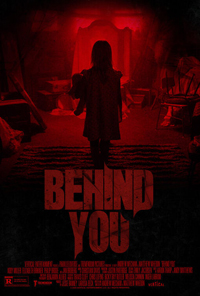The Mirror Crack’d: Mecham and Whedon Wax Derivative in Debut
 Bearing all the marks of a strained production is Behind You, the directorial debut of Andrew Mecham and Matthew Whedon (brother of Joss), a familiar horror exercise which can’t quite seem to vocalize an original idea anywhere in its frazzled narrative. With a tiresomely reworked script, wooden performances and cliched tropes, it’s a film which relies solely on some infrequent but inspired visuals considering its limited scope and budget.
Bearing all the marks of a strained production is Behind You, the directorial debut of Andrew Mecham and Matthew Whedon (brother of Joss), a familiar horror exercise which can’t quite seem to vocalize an original idea anywhere in its frazzled narrative. With a tiresomely reworked script, wooden performances and cliched tropes, it’s a film which relies solely on some infrequent but inspired visuals considering its limited scope and budget.
When their mother dies and their father is nowhere to be found, sisters Olivia (Addy Miller) and Claire (Elizabeth Birkner) are taken to their estranged Aunt Beth’s (Jan Broberg) home. Beth wants nothing to do with the children, but upon the insistence of Camilla (Aimee-Lynn Chadwick), a friend of their mother’s, they are left to stay. Olivia and Claire get chummy with Beth’s neighbor and frequent visitor Charles (Philip Brodie), who helps around the house and seems to share strange interests with Beth, who has all the mirrors mysteriously covered in the home.
At the center of Behind You is Jan Broberg as the unevenly conceived Aunt Beth, initially formatted as a villain before switching to the narrative’s savior when its inevitable twist is revealed. Mecham and Whedon attempt to circumvent narrative expectations with what plays like a false ending, but this only makes the last act of the film feel overly prolonged and laborious.
Of greater interest is perhaps a chance to see Broberg in lead role for anyone who has had the chance to see the 2017 documentary Abducted in Plain Sight which documents the stranger-than-fiction traumatic upbringing of Broberg, who, try as she might, doesn’t have a lot of room to play with the rote dialogue of the screenplay. As her initially nefarious cohort, Philip Brodie’s Charles has the added distraction of a troubled sound design plaguing his line delivery.
Faring a bit better are Elizabeth Birkner and Addy Miller as the compromised youths, dumped in their aunt’s home like the incest-originated children of Flowers in the Attic—but no amount of angsty sighs and hysterical anguish can quite salvage any of their sequences either. Whedon and Mecham’s script is proliferated with nonsense, including some minor unintentional campy moments involving a (surprise!) peanut allergy for pointless tension, while its themes fare unfavorably in comparison to all its narrative elements, which are reminiscent of Ciaran Foy’s recent Eli (2019) or the South Korean thriller Into the Mirror (2003), which was remade by Alexandre Aja as Mirrors (2008).
★½/☆☆☆☆☆


